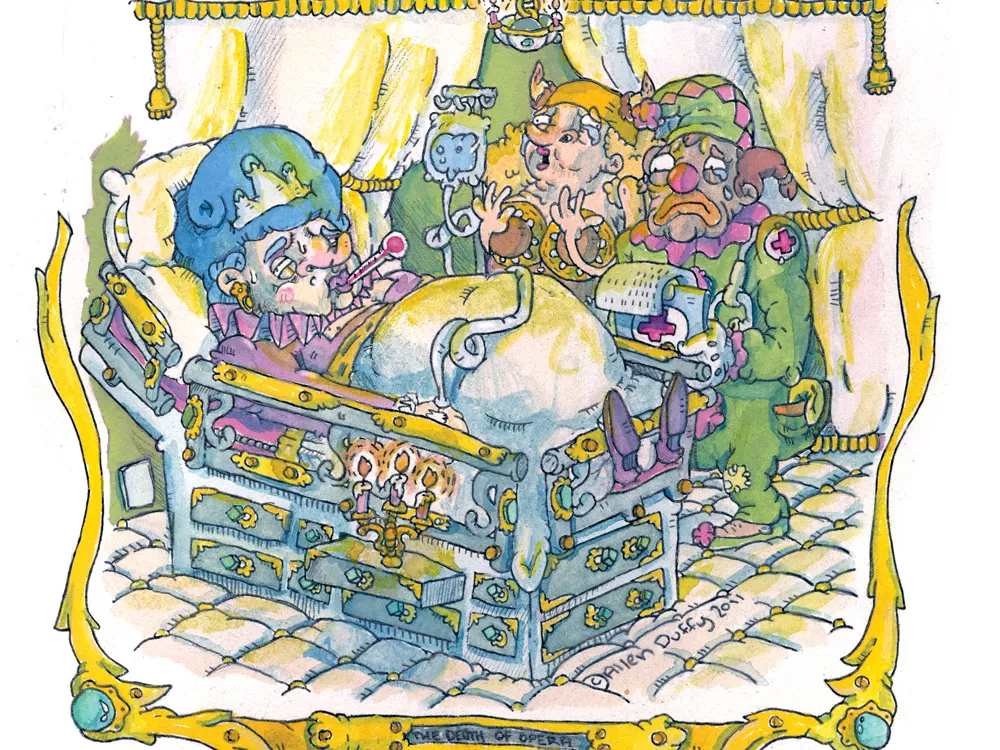The Spokane Opera simply vanished about year ago. No goodbye, no swan song, no promises to return bigger and better — not even an explanation.
The opera’s annual Hot August Nights performance never happened. The fall production was cancelled. So was Diamonds and Divas, the glitzy New Year’s Eve fundraiser. The opera’s executive director, Bill Graham, acknowledges that he could have handled the situation better.
“It’s my fault for not [announcing the cancellations] on the website,” Graham says.
The demise of Spokane Opera perhaps isn’t entirely surprising. Since the onset of the Great Recession, opera productions nationwide have shut down due to lack of funds. Opera Pacific in Orange County, Calif., folded in 2008. Connecticut Opera and the Baltimore City Opera closed in 2009. The Cleveland Opera went on hiatus in 2010, though it’s hoping to stage a comeback. And the Mercury Opera of Rochester, N.Y., closed earlier this year.
Indeed, operas are big — and expensive — affairs. The art form ties together a host of dramatic vocations: singing, orchestra, theater, scenery, lighting, costumes, dance, visual arts and a good story.
“The way these elements are combined is both the challenge and the miracle of opera and there simply is nothing like it,” says Fred Plotkin, a nationally known opera producer, director and writer. “When you attend an opera, you have the amazing experience of hearing gorgeous human voices sailing over 50 to a hundred instruments in the orchestra.”
Still, only about 5 percent of people in any given community are aware of and are willing to attend opera, Plotkin says. In 2007, about 6,000 people attended a Spokane Opera event, according to tax filings.
It would only get worse.
At its healthiest, Spokane Opera organized a variety of events: the summer Hot August Nights performance, a series of dinner theater productions at Luigi’s Italian Restaurant, the Diamonds and Divas fundraiser, plus full-scale productions of Tosca, The Magic Flute and Pagliacci.
But the opera’s fundraising difficulties started as far back as the Sept. 11, 2001, attacks, Graham says. And moving performances to the Fox Theater in 2008 — they’d previously been held at the Bing Crosby Theater and Central Valley High School — proved to squeeze already slim margins. Each full-service Spokane Opera production costs between $60,000 and $100,000, according to Graham.
But Graham insists Spokane Opera isn’t dead but rather is on life support. He says he’s currently trying to line up sponsors for its Hot August Nights — which costs $15,000 to produce — at the Museum of Northwest Arts and Culture. He hopes that can lead into a full production in either late 2012 or early 2013.
Some doubt whether it will be revived. Like many small arts organizations, the opera relied on private contributors, especially a small group of individuals who donated large amounts of money, according to Greg Presley, who has played piano with the Spokane Opera.
“I think that what they’re calling hiatus is essentially
that they are back to drawing board in how the will reconstitute
themselves,” says Presley.
But while Spokane Opera struggles, their compatriots across the state line are prospering. Opera Coeur d’Alene just staged a production of Faust that drew 1,200 people in a weekend, according to Mike Bullard, president of the opera’s board.
“We currently have the [same-sized audience] as Spokane Opera did when it was doing well,” Bullard says.
Opera Coeur d’Alene has consistently been able to raise about $100,000 a year and hopes to stage two full productions back-to-back in 2013, he adds.
Bullard says that both opera companies can help each other thrive. “If we build our audience and the Spokane Opera builds its audience, that’s going to help us both,” he says.
In the meantime, opera lovers have one more option. Nationally recognized opera companies have begun performing in live broadcasts beamed around the country, including to screens at NorthTown Mall.
“They’re amazing productions, a lot of resources have gone into them, they’ve used their most photogenic singers,” says Verne Windham, program director for KPBX radio. “They made every detail work for it to be a huge, grand experience.”
Though it’s a development many find laudable, some worry it is depriving opera seats of bodies.
“Many suburbanites are also abandoning the urban companies, preferring the HD transmissions from the Metropolitan Opera and other big companies that arrive in local movie theaters,” Plotkin says in an email.
“I think HD transmissions are great as a supplementary opera experience,” he adds, “but they will never replace what audiences feel when attending live opera.”

